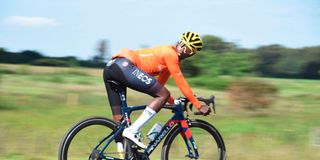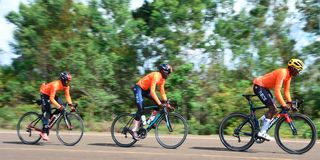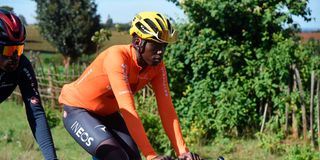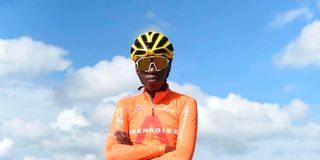Premium
From boda boda riding to a fledgling career in cycling

What you need to know:
- he race bikes were very different—light, fast, and the riding posture was new to me.
- Changing gears, using the brakes…it all felt strange at first. I got backaches and knee injuries.
- Being welcomed by the top riders was very cool.
Evan Wangai is a professional cyclist and cycling coach based in Eldoret. He grew into the sport after switching from being a boda boda rider. Evan, who studied at Subukia Day Secondary School in Nakuru County, also worked in a bakery before concentrating on cycling.
Born on February 8, 1996 in Nakuru County, the second-born in a family of five has competed in some major cycling races including African Continental Championships, Grand Nairobi Bike Race, Aberdare Cottages C70 Madaraka Day Challenge in 2024 and Tour Eritrea in 2017. Evan has worked with top cycling teams in Kenya - Kenya Riders (2016-2024), Team Amani (2022-2023), Ride United (2024) and INEOS (2025). He is a cycling coach with INEOS Eliud Kipchoge Cycling Academy in Kaptagat.

Where did your love for cycling begin?
Honestly, since nursery school. My older brother Onesmas Wangai had a bike, and I was always fascinated by it. My father was also a cyclist in the late '80s and even used to repair bikes. So, cycling runs in the family. I owned a bike in primary school, too.
Did you try any other sports before taking cycling seriously?
Yes, I tried running the 25-lap race in secondary school, but I never really liked it. I wanted something more fun and exciting. My dad used to tell me he was the best cyclist at his age, and I admired that. I wanted to be like him.
Tell us about your experience in secondary school...
I joined Form One in 2010. The school was eight kilometres away from home, so my parents bought me a bicycle to help with the daily commute. That was a game-changer. I never got late and even enjoyed friendly races with schoolmates.

What happened after that?
After Form Four in 2013, I worked in Kitale, Trans Nzoia County for about a year in a bakery, making and selling cakes. But, I quit the job and moved to Eldoret, Uasin Gishu County to live with my elder brother. One day, I saw some people riding and thought, “Why not try it out?” I asked my parents to help me get a bike. They bought me a Black Mamba, and I was thrilled. That’s how my journey began.
What challenges did you face while starting out?
So many. I didn’t know how to train properly or follow a routine. I lacked proper gear—no good helmet, shoes, or cycling clothes. And the Black Mamba was very heavy compared to race bikes.

How did you manage your training with work?
I was a boda boda rider, transporting people during weekdays. I trained over the weekends. If a race was coming up, I’d stop working for a bit to focus on training. Since I was earning from my job, I didn’t feel too much pressure to succeed quickly in racing. I used to earn Sh800 per day from boda boda. And then after maybe taking lunch and supper, I would save like Sh500 per day. It was good money at that time because I had no family. I was just alone.
At what point did competitive cycling become a thing for you?
Things got serious when I heard the Kenya Riders (KR) team was recruiting riders. I hadn’t planned on joining any team before that, but I gave it a try and joined them in 2015.
It was both exciting and tough. The race bikes were very different—light, fast, and the riding posture was new to me. Changing gears, using the brakes…it all felt strange at first. I got backaches and knee injuries. Being welcomed by the top riders was very cool. Going together with them to training and getting more pieces of advice and tactics and knowledge from them was just amazing. They also introduced to us to watching the big races like Tour de France.

What has kept you going despite the challenges?
My passion for cycling, the legacy from my father, and the joy I get from the sport. Even when things were tough, I remembered why I started—and that always pushed me forward.
What does it take to become a top cyclist?
It demands total concentration, consistency, and sacrifice. Recovery is just as important as training, and using the right gear, like a good aerodynamic helmet, can significantly boost performance.
I started racing professionally after joining Kenyan Riders in 2015 and represented Kenya for the first time during the Tour Eritrea in 2017. That tour had seven tough stages. Although it was my first experience racing for seven consecutive days, I finished 27th overall and even placed fourth in Stage Three. Wearing the Kenyan jersey brought pride and responsibility—you want to give it your all for your country.
Cycling at a high level means committing to daily routines. You must wake up early, do stretches, eat well, and follow a strict training plan. It's not just physical, it's a lifestyle. You sacrifice social activities like hanging out, partying, or going to clubs. Focus is key.
To excel, you must train every day, stay punctual, and be mentally tough, especially on challenging climbs or when riding in a big peloton. In the end, it is about discipline, passion, and the will to represent your country with pride.
What does cycling mean to you?
Cycling has been my life for the past nine years. It has been my bread and butter. While I now focus more on coaching, the discipline remains the same. My day starts early with stretches, followed by the main training session. After lunch and rest, another round of stretches follows. In camp, everything is structured—meals are prepared, and we eat by 7pm, with lights out by 9pm. Cycling teaches you consistency, discipline, and routine. I carry those values with me every day. It’s more than a sport—it is a way of life.
